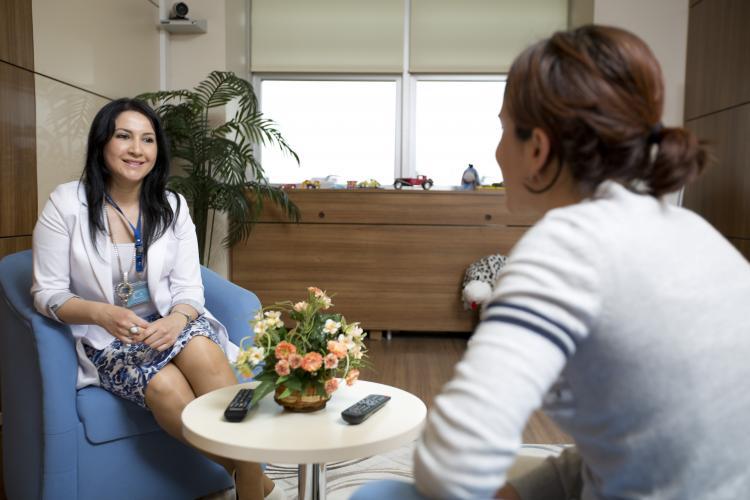EU and Turkish authorities improve protection of vulnerable groups in the justice system

The Turkish Minister of Justice, in a major effort to ensure better protection of children and vulnerable groups, in 2017 launched an ambitious plan of setting up and building specially designed Judicial Interview Rooms. This planned improvement is the final step in a fruitful collaboration between the EU, UNICEF, and the Turkish Ministry of Justice.
Numerous research shows that victims from vulnerable groups such as children or victims of sexual assault can live the complexity of judicial process as a new form of aggression that creates new trauma. This phenomenon is called secondary victimisation.
Various international conventions and guidelines acknowledge this fact and require State actors to put a sound system in place to protect the rights and well being of these vulnerable persons.
An important measure resulting from this approach is the creation of specially equipped Judicial Interview Rooms - AGOs - which stands for “Adli Görüşme Odası” as an abbreviation in Turkish-. An AGO is a room in the courthouse, with high-technology equipment and designed to minimise secondary victimisation and ensure safe and less intimidating judicial interview that is in accordance with the age, the level of development and the psychology of children or vulnerable adult victims of crime. AGOs are designed to serve not only victims but all children who are in contact with the law (including offenders, witnesses and under protective processes) as well as adults who are victims of sexual violence, domestic violence and/or others who are vulnerable/at-risk.
In Türkiye, the efforts to strengthen the child justice system have been accelerated since 2005, particularly after the adoption of the new Penal Code (nr. 5237), new Criminal Procedures Code (nr. 5271) and the Child Protection Code (nr. 5395) as well as the relevant secondary legislation. Within this context, the protection of children and vulnerable victims of crime was identified as a legal requirement.
As an initial step, the Child Monitoring Centers (ÇİMs) and University Child Protection Centers were established to ensure the protection of children (particularly victims) from the hardships of the judicial processes.
Hence, the “Child-friendly Judicial Interview Rooms” (ÇAGOs) were developed under the “Justice for Children Project” funded by the EU and implemented by UNICEF; with a view to prevent secondary victimisation of children in judiciary processes. To this end, national and international consultants organised discussions, shared the international best practices and developed standards for the interview rooms to be established in Türkiye Following the endorsement of the standards on “Child Judicial Interview Rooms” (CAGO), the first pilot interview room was set up in Ankara Batı Courthouse, while 23 provinces and 26 courthouses were selected as pilots for the establishment of 31 rooms in total.
According to these standards, ÇAGOs were designed in a way to serve all children who have entered the judiciary system (including child victims, child witnesses, children in need of protection and children who have been pushed into crime). Introductory training sessions were conducted with more than 100 juvenile justice system professionals (judges, public prosecutors and social work officers) working in the selected pilot provinces.
In the meanwhile and to safeguard the sustainability of the Project's results, ÇAGOs were integrated in the various national Strategy Documents for preventing the victimization of children pushed into crime or who are victims of crime within the justice system in general.
The feedback coming from these pilot projects indicated that such special spaces are also necessary for other vulnerable victims such as women and refugees. Thus, while securing the priority for children the scope of ÇAGOs were enhanced and evolved into AGOs in a way to include other vulnerable victims.
Following the adoption of the Judicial Interview Rooms By-Law, in February 2017, UNICEF and Ministry of Justice Victim Rights Department started plans to ensure a smooth transition and enhanced staff capacity to safeguard quality interviews. In this regard, UNICEF established an official partnership with the Child Protection Centers Society (ÇOKMED) and trained more than 500 court experts on AGO structure, legislation, communication and interview techniques between March and May 2017.
The AGOs simultaneously became active as of 03.04.2017 and so far more than 250 interviews have been conducted in the pilot provinces.
Ministry of Justice, UNICEF and ÇOKMED are currently continuing their cooperation to develop full-fledged guidelines for various involved professionals (namely the judges, prosecutors, lawyers, court experts and clerks) as well as developing a monitoring framework and visibility materials.
Due to the successful outcomes and positive feedback right after the activation of the AGOs, the Ministry of Justice decided to establish AGOs in different cities. As of June 2017, 31 additional AGOs are planned to be established in various cities, bringing the total number of AGOs to 61 before the end of 2017[1]. Moreover, Ministry of Justice also decided to automatically include AGOs in the new Courthouse construction plans.
UNICEF, Ministry of Justice and ÇOKMED have already agreed to extend their successful cooperation in order to expand the ongoing efforts towards increasing the capacity of the judges and prosecutors. According to the initial plan, more than 650 judges and prosecutors are expected to receive training on AGO-type interview as well as on communication skills and protection. In addition, monitoring activities and site-visits will also be conducted throughout this partnership.

[1] The additional planned locations are as follows: Kahramanmaraş, Kilis, İskenderun, Batman, Edirne, Bakırköy (İstanbul), Gebze, Çorlu, Rize, Isparta, Adıyaman, Kastamonu, Ordu, Uşak, Kırşehir, Kilis, Burdur, Giresun, Nevşehir, Kocaeli, Niğde, Kırıkkale, Karaman, Erzincan, Balıkesir, Sivas, Osmaniye, Bolu, Kütahya.



